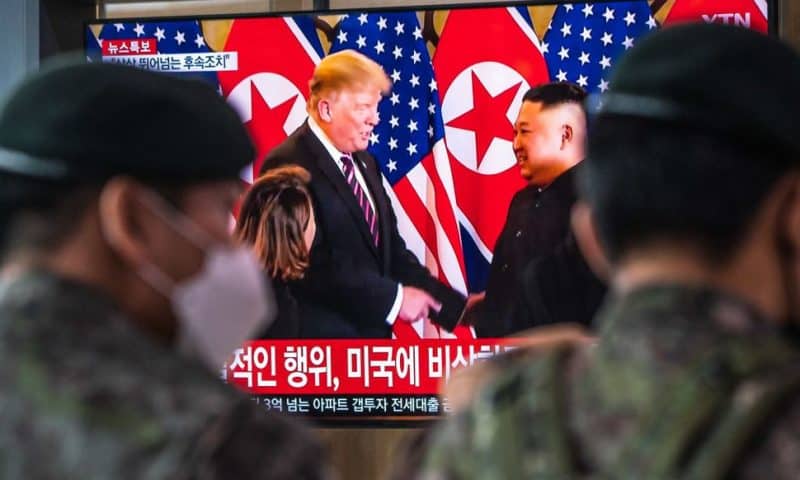Amid new expectations for a breakthrough from the Trump administration, ‘a surprise thing may still happen,’ says Kim Yo Jong, sister to North Korean leader Kim Jong Un.
NORTH KOREA ON FRIDAY raised the requirements for denuclearization talks with the U.S., all but dismissing any future negotiations before the November presidential elections this year unless the Trump administration considers a “withdrawal of hostility” in addition to sanctions relief.
“I doubt that things like the DPRK-U.S. summit talks would happen this year,” Kim Yo Jong, the sister of leader Kim Jong Un, said in a statement early Friday, using North Korea’s preferred name for itself. The younger Kim, who holds senior positions in the North Korean government, has emerged in recent years as one of the most powerful officials in the country and among the most influential within her brother’s inner circle.
The statement follows speculation that President Donald Trump and his top advisers are working toward a breakthrough with the Hermit Kingdom in the lead-up to the election, following three high-profile but ultimately unsuccessful meetings between Trump and the North Korean leader in 2018 and 2019 in Singapore, Vietnam and at the Korean Peninsula’s demilitarized zone. U.S. Envoy for North Korea Steve Biegun visited South Korea this week in what many saw as the preliminary stages of potential new negotiations.
When asked this week about new potential talks – the kind that might bolster Trump’s reelection prospects – Secretary of State Mike Pompeo declined to comment in detail.
“But I think it’s worth noting, with respect to North Korea,” he said, “the Trump administration has taken an approach of engagement to have serious conversations about the strategic threat that North Korea presents.”
“We took seriously this obligation to reduce proliferation and to try and convince the North Koreans to make the fundamental shift that says that those weapon systems actually create risk for it rather than creating the security blanket that they have historically believed that it did,” Pompeo said.
In her statement Friday, Kim dismissed this thinking, saying, “We are fully capable of living under any sanctions, so there is no reason for us to be driven by the U.S. I hope that the U.S., at this moment in time, does not harbour such a pipedream as trying to restrike a bargain which was put on the negotiations table at the Hanoi summit talks.”
She cited a litany of other grievances with the U.S., including Defense Secretary Mark Esper’s classification earlier this week of North Korea – along with Iran – as “rogue states,” and the State Department’s condemnation of North Korea as among the world’s worst human rights abusers.[
Kim did not specify what a “withdrawal of hostility” would mean specifically. North Korea has previously insisted the U.S. cease military exercises with its ally South Korea – ongoing drills that both North Korea’s leadership and Trump refer to as expensive “war games” – or even withdraw all of the almost 30,000 U.S. troops based on the peninsula.
She also offered a mixed message on the threat North Korea poses to the U.S. At one point in the statement she said the U.S. “may still worry about receiving a Christmas gift on the eve of the presidential elections, which it hasn’t received so far” – an apparent reference to North Korean threats at the end of 2018 many analysts considered a warning of new nuclear tests. But that warning was followed later by a more benign message: “We do not have any intention to pose a threat to the U.S., and Chairman Kim Jong Un has already made it clear to President Trump.”
Despite criticizing the actions of the Trump administration, Kim touted the “special relations” between her brother and Trump himself, adding that “the unique friendly relations between our comrade chairman and the U.S. president are greatly paying off.”
“A surprise thing may still happen, depending upon the judgement and decision between the two top leaders,” she said.

